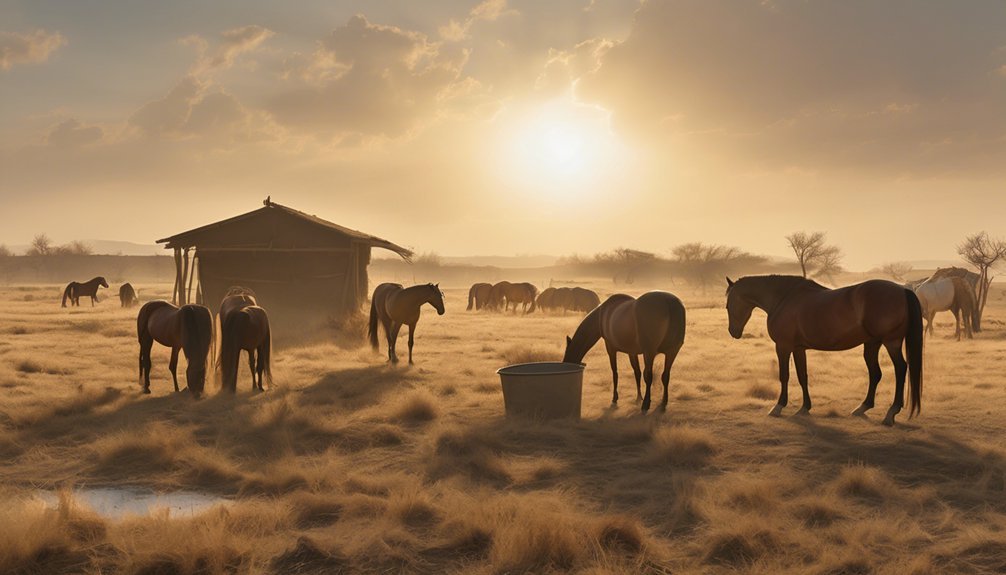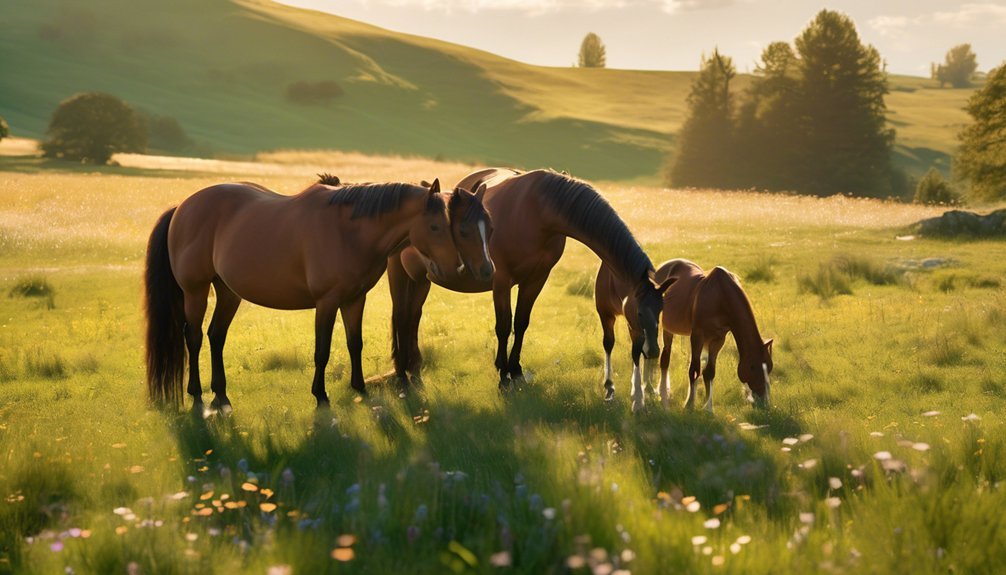
Weather changes significantly affect your horse's appetite and nutrient needs. Cold temperatures can lower food intake, while heat and humidity might disrupt grazing habits. Seasonal shifts also alter forage quality, demanding careful dietary adjustments to keep your horse in optimal condition. Understanding these dynamics is crucial for maintaining your horse's health. What adjustments should you consider for different weather conditions, and how can you ensure your horse thrives year-round?
Key Takeaways
- Cold weather can reduce a horse's appetite due to discomfort and lower metabolic rates, necessitating careful monitoring of food intake.
- Heat and humidity lead to decreased grazing and eating, prompting the need for smaller, more frequent meals to maintain nutrient intake.
- Seasonal changes affect forage quality and availability, requiring adjustments in diet, including hay or grain supplementation during colder months.
- Hydration is essential for temperature regulation; ensuring fresh water access can help prevent dehydration and support appetite in extreme weather.
- Feed types should be adapted based on weather conditions, increasing energy content in winter and focusing on moisture-rich forages in summer.
The Effects of Cold Weather on Horse Appetite

When temperatures drop, horses often experience changes in appetite that can significantly impact their overall health.
In cold weather, your horse may eat less due to a lower metabolic rate or the discomfort caused by biting winds. It's essential to monitor these appetite changes closely, as reduced food intake can lead to weight loss and nutritional deficiencies.
To counteract this, consider offering warmer feeds or increasing hay availability, which can encourage consumption. Additionally, providing shelter can make your horse feel more comfortable, promoting better eating habits.
Understanding these dynamics helps you ensure your horse maintains a balanced diet during chilly months, ultimately supporting their well-being and energy levels.
Keep an eye on their behavior to adjust their feeding accordingly.
How Heat and Humidity Influence Feeding Behavior
As temperatures rise and humidity levels increase, horses often alter their feeding behavior, which can have significant implications for their health and nutrition.
Heat stress becomes a real concern, as it can lead to reduced appetite and changes in feeding frequency. You might notice your horse grazing less or showing reluctance to consume feed, primarily due to the humidity effects on their comfort.
Behavioral changes often manifest as restlessness or increased drinking, indicating their body's struggle to cope with the heat.
To support your horse during these hot months, monitor their water intake and consider offering smaller, more frequent meals. This can help maintain their nutrient needs while accommodating their altered feeding habits.
Seasonal Changes and Their Impact on Nutritional Needs

Changes in seasons can significantly affect a horse's nutritional needs. As you transition from one season to another, you'll notice variations in seasonal forage availability.
In spring and summer, fresh, lush grasses abound, providing ample nutrients. However, as autumn and winter arrive, forage quality often declines, necessitating nutrient adjustments in your horse's diet.
You may need to supplement with hay or grains to ensure your horse receives adequate energy and vitamins during the colder months. Pay attention to your horse's body condition and adjust its feed accordingly, ensuring it maintains optimal health throughout the year.
The Role of Hydration in Temperature Regulation
Hydration plays a crucial role in maintaining your horse's temperature regulation, especially during extreme weather conditions. When temperatures rise or drop, your horse's body relies on adequate hydration to manage internal heat levels effectively.
Implementing proper hydration strategies can mitigate temperature effects on your horse's appetite and overall health. During hot weather, ensure your horse has constant access to fresh water, as dehydration can lead to elevated body temperatures and decreased performance.
In colder months, consider offering warm water to encourage drinking, preventing the risk of dehydration. By monitoring hydration closely, you'll help your horse thrive regardless of the weather, ensuring they remain comfortable and their nutrient needs are met efficiently.
Adjusting Feed Types According to Weather Conditions

When weather conditions shift, adjusting your horse's feed types becomes essential to meet their changing nutritional needs.
In colder months, consider altering your feed formulation to include higher energy content, as your horse may require more calories to maintain body heat. Here, you might increase the ratio of fats or grains in their diet.
Conversely, during warmer months, focus on forage selection with more moisture content, like fresh grass, to help keep them hydrated and comfortable.
Pay attention to the protein levels as well, ensuring they're consistent with your horse's activity levels.
Regularly evaluate their appetite and adjust accordingly, ensuring your horse stays healthy and satisfied throughout the changing seasons.
Monitoring Body Condition Score Throughout the Year
Adjusting your horse's diet according to weather conditions is just one part of maintaining their overall health.
Monitoring your horse's body condition score (BCS) year-round is essential for ensuring they receive the nutrients they need. Changes in temperature and humidity can influence their appetite and metabolism, making it crucial to assess their BCS regularly.
A consistent evaluation helps you identify whether your horse is gaining or losing weight, allowing you to adjust their feed accordingly. Look for visual signs like rib visibility and overall muscle tone.
The Importance of Consistency in Feeding Routines

Establishing a consistent feeding routine is vital for your horse's health and well-being, as it helps regulate their metabolism and maintain a stable appetite.
When you stick to regular feeding schedules, your horse learns to anticipate meals, which can reduce anxiety and promote a healthy digestive process.
Any routine adjustments—whether due to weather changes or other factors—should be made gradually to avoid upsetting your horse's stomach.
Consistency in feeding not only supports optimal nutrient absorption but also allows you to closely monitor your horse's response to food.
Recognizing Signs of Nutritional Deficiencies
Recognizing signs of nutritional deficiencies in your horse can be crucial for maintaining their overall health and performance.
Pay close attention to changes in behavior, coat condition, and energy levels. If you notice a dull coat, lethargy, or unusual weight loss, these could be deficiency symptoms indicating poor nutrient absorption.
Additionally, watch for signs like muscle weakness or changes in hoof quality, which may reveal a lack of essential minerals or vitamins.
It's essential to monitor your horse's appetite closely; a sudden decrease may signal that they're not receiving the nutrients they need.
Tips for Maintaining Optimal Nutrition in Changing Weather

As weather conditions fluctuate, it's vital to adapt your horse's nutrition to ensure they receive the necessary nutrients for optimal health.
Here are three tips to help you maintain their diet during these changes:
- Monitor Forage Quality: Regularly check your hay and pasture for nutritional value. Weather can affect these, so adjust your horse's intake accordingly.
- Incorporate Nutritional Supplements: If forage quality declines, consider adding specific supplements to fill nutrient gaps, ensuring your horse stays healthy.
- Adjust Feeding Schedule: Changing temperatures can influence appetite. You might need to modify the times you feed or the amounts to keep their energy levels balanced.
Frequently Asked Questions
How Do Weather Changes Affect a Horse's Digestive Health?
Weather changes can disrupt your horse's digestive health by affecting hydration levels and the production of digestive enzymes. When temperatures fluctuate, ensure your horse stays hydrated to maintain optimal digestive function and overall well-being.
Can Weather Influence a Horse's Behavior Around Food?
Yes, temperature extremes and seasonal changes can affect your horse's behavior around food. Hot weather may cause decreased appetite, while cold temperatures can lead to increased foraging, impacting their overall feeding habits and nutritional intake.
What Are the Signs of Overfeeding in Different Weather Conditions?
Think of a horse's belly as a delicate balance. In various weather conditions, overfeeding signs include weight gain, lethargy, and digestive issues. Stay attentive to these clues to ensure your horse's health remains optimal.
How Does Age Affect a Horse's Response to Weather Changes?
As your horse ages, its metabolism changes, affecting how it responds to weather. Senior horses often require adjusted nutrition to maintain health, especially during extreme conditions, ensuring they receive adequate energy and essential nutrients.
Are There Specific Supplements Needed During Extreme Weather?
During extreme conditions, you might consider specific supplement types like electrolytes and antioxidants. They can help maintain hydration and support immune function, ensuring your horse stays healthy and energized despite the challenging environment.
Conclusion
In conclusion, understanding how weather changes impact your horse's appetite and nutrient needs is crucial for their overall well-being. Just as a flower bends to the wind, your horse's dietary requirements shift with the seasons. By adjusting feed types, ensuring hydration, and monitoring their body condition, you can help your equine companion thrive no matter the weather. Stay attentive to their signs and maintain a consistent feeding routine to keep them healthy and happy throughout the year.





